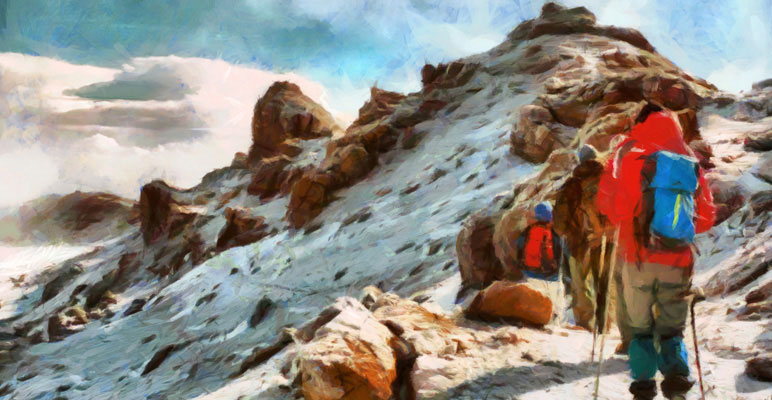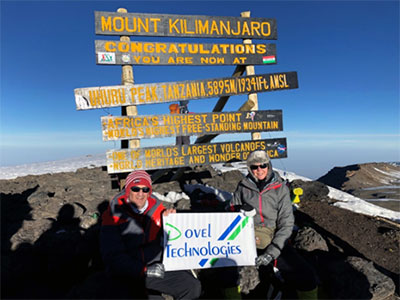Why are Travel Adventures Important for Actuarial Entrepreneurs?
By Elma Levy and Dov Levy
Innovators & Entrepreneurs, November 2022

When we wrote our book Partners in Life and Work, Finding Success Through a Partner Business, we decided to include a chapter about our adventure travel because we know that the benefits of our adventure travels, for us as a couple, as entrepreneurs, and for Dovel as a growing company, were clear. The feedback from the publisher was one of surprise: What is the reason for this chapter? This is not a travel book!
We explained that building a company and entrepreneurship is very demanding and a 7/24 job. Add to that the complexity of working day-in-day-out with your spouse, and you have a definite need for experiences that force you to think differently and cause you to be off the grid.
We also see significant correlations between planning and executing adventure travel together and building and growing a company together: Risk assessment and mitigation, lots of “planning for the worst and hoping for the best,” knowing each other's strengths and weaknesses, and self-awareness. Adventure travel has the added benefit of requiring strong physical condition, so it forces us to stay in shape, which is not easy for busy entrepreneurs as there seems to always be competing needs more critical than exercising and eating healthy.
So, why is adventure travel important to entrepreneurial actuaries? This article will address the question, and perhaps it will incentivize some of you, setting you on a journey of adventure travel. We certainly hope it will as we know the rewards.
What do Entrepreneurship and Adventure Hiking Have in Common? Planning, Planning, and More Planning
Both growing and scaling a company, and executing a complex adventure trip starts with planning. Prepare for things to go haywire at the most inconvenient times. There are multiple questions that you will have to identify, discuss, decide on a road map, prepare and execute. Indeed, we all know this intuitively about a company. Still, it is just as complex and just as rewarding to identify an exciting adventure trip, plan it, prepare for it, and then actually go. … This last step might be the hardest as you will likely be off the radar, so part of the prep involves ensuring that the company is ready for you not to be available for five to 10 days. At this point, many of you will already stop reading, as you are sure that this is impossible, but please keep reading. We found the ability to disengage from the everyday stress of running our company to be very beneficial.
As complex as it is to decide on the division of labor between you and your business/life partner, it is just as complex when it comes to this with your travel/life/business partner. What are the swim lanes? Who “owns” what? Are the skillsets that helped you decide on the business swim lanes the same as those for complex travel? What comes naturally for each one? It is not necessarily true that the skills required for entrepreneurship are similar to those needed to successfully plan complex travel, but in our case, we see a parallel between the company and adventure travel.
As married co-founders of Dovel Technologies Group, we had a well-understood and defined understanding of each other's domains: Dov spent most of his time planning and executing long-term, full life cycle, missions, critical information systems, which required lots of planning and organizing, whereas Elma was the planner and corporate governance organizer, taking care of the details of running an organization. So when it comes to our travel, Dov concentrates on the planning, such as where to go and the best time of year (rainfall, snowfall, temperature, etc.), and Elma takes care of the logistics, such as flight reservations, travel insurance, etc. Perfect division of responsibilities based on our strengths, similar to how we successfully ran Dovel.
The question of risk tolerance is an essential question both when building a company as well as with adventure travel. You have to learn and challenge how much risk you can manage. There is a risk when summiting Kilimanjaro, no doubt about it, but that makes it part of the fun as long as you know how to mitigate the risk. In a way, you manage these risks in the same way you manage the risks at your company: Planning, anticipating, listening to people who have done what you're about to do, and, most of all, getting physically and mentally ready! Always preparing for the worst and getting ready. …
We talked about one possible and not unlikely scenario and how to handle it: What if one of us had to discontinue the hike before getting to the summit? We decided that if this is due to low oxygen levels, the non-impacted will continue since the impacted will have a guide taking them to lower altitudes, where the problem would be immediately solved. However, if either of us cannot continue for any other reason, we stay together.
Staying in Good Shape and Taking Time off
One of the key benefits of strenuous adventure travel is the necessity to stay in shape … adventure travel has definitely done this for us. Of the hazards of entrepreneurship we usually do not talk about are the poor lifestyle habits we develop: The long hours in the office, most of them sitting behind a computer monitor, and poor diet, like a candy bar with coffee on the run (sound familiar?). Over the years, this results in lifestyle conditions such as excess weight and worse.
However, if you know you have a strenuous hike in the near future, you will definitely have a solid incentive to maintain your weight and stay in good shape. Your reward is overcoming the challenge of the hike and a successful adventure. What can be more rewarding than looking back on an amazingly exciting experience that made you overcome challenges? Nobody can take that away from you. …
Once we decided to summit Kilimanjaro, we began researching and preparing, including getting in shape for a demanding multi-day hike at a very high elevation. First, we had to find a tour company, as it is not permitted to hike up the mountain without a certified guide. Next, the best time of year to undertake this journey, which we learned was January. Also, we learned all we needed to know about altitude sickness and how to minimize this risk (Diamox). We went on day hikes and multi-day hikes in freezing cold temperatures to mimic the conditions and make sure our gear was adequate. We knew that the last night, as we would reach 19,341 feet, it would be freezing (at the summit, it is between 20 and -20 degrees Fahrenheit), and the air would be thin. We knew we had to prepare for this cold, so on the final climbing night, which took seven to 8 hours of non-stop hiking up, we wore seven top layers and four bottom layers of clothing.
One significant benefit for company founders is that adventure travel provides time off for you, but it also allows company management to run things without you. As we all know, we live in a connected world. In today's world, when we are all connected to our smartphones, it is impossible to escape from telephone calls, voice mails, e-mail, text, WhatsApp, Facebook, etc. Thus, even the best vacation does not provide any separation from work. However, on adventure travel with either spotty or no cell phone connection, you are forcibly disconnected from work, and you learn that everything works out just fine (if not better sometimes)
We engaged the Dovel team, which was very exciting to them. We brought a SPOT tracker with us so that people could track our progress, and many followed us daily and shared our progress. One employee, an avid adventurist, woke his kids up to show them that we were reaching the summit. At the summit, we took out the Dovel sign for the picture. We had taken Dovel to new heights, and the Dovel team had traveled with us.[1] It was a wonderful sharing experience for the company and the team.
This was an eight-day grid hike, and, as almost always, you prepare for the worst, and all turns out fine. We did OK, even with blood oxygen levels going to 73%, and the company and the team did just fine. Everyone enjoyed the experience with us, the team learned that they do not need us to make all the decisions, and we came back inspired, invigorated, and proud of our accomplishment.

Photo: Elma and Dov Levy. Elma and Dov took Dovel to the top of Kilimanjaro.
We are excited to share this experience with you, fellow business owners and entrepreneurs, as we know the stresses and poor lifestyle choices that come with owning and running a company, and we also know that strenuous and challenging adventure travel can be a cure. We hope you found this incetivizing and will give it a try.
We are in our post-company days, since we sold our company, and we now have more time to devote to our favorite activity: Adventure travel!
Statements of fact and opinions expressed herein are those of the individual authors and are not necessarily those of the Society of Actuaries, the newsletter editors, or the respective authors’ employers.
Elma Levy and Dov Levy are coauthors of Partners in Work and Life: Finding Success Through a Partner Business (Routledge, 2022).
Elma Levy is an entrepreneur, investor, leadership coach, and public speaker. She is cofounder and principal (with her husband Dov) of The Eldov Group, LLC, a boutique investment and startup advisory in the Washington, D.C. area.
Dov Levy is an entrepreneur, investor, and leading expert in large-scale, mission-critical IT solutions. He cofounded Dovel Technologies and served as its chief technologist until the company's acquisition in 2019, remaining a dynamic leader at the forefront of technological innovations.
